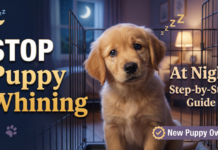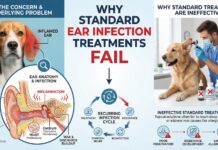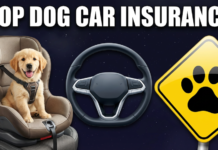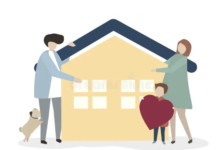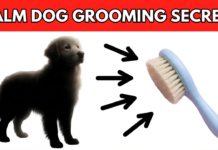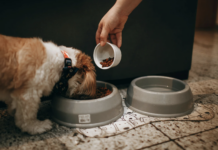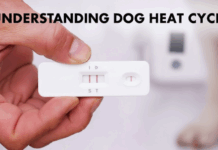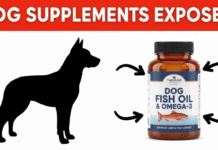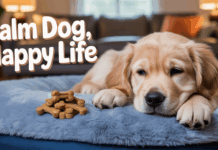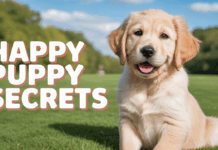Last Updated on March 7, 2022 by Dogs Vets
Do Bernedoodles Drool?
Drool is a very significant consideration when purchasing a dog. Does dog drool affect allergy symptoms? Is it true that dogs who drool require more attention?
What causes dog drool, and how can you prevent it? Is there anything available to assist or counteract dog saliva?
Bernedoodles aren’t renowned for being drooling dogs. Drooling is caused by a variety of variables, including heredity; face anatomy, environment, and other circumstances, so your Bernedoodle may drool on occasion.
Bernedoodles, which are a hybrid between a Bernese mountain dog and a Poodle parent, inherit drooling from both parents. Bernese Mountain Dogs are one of the top big-drooling breeds, thanks to their huge jowls and proclivity for staying cool.
You might not see the Bernedoodle on a list of dogs that are prone to drooling. This isn’t to say they won’t slobber at some point. Drooling can be caused by a variety of variables, such as a dog’s attitude, temperament, and surroundings. There’s a lot to talk about, so let’s get started.
What Is Dog Drool?
Pytalism, often known as dog drool, is the act of saliva flowing from the mouth. Drool is generated by glands in the mouth and is responsible for keeping the mouth wet at all times. Your dog’s slobbering may not be apparent, but it’s still there, performing its job.
Drooling is a crucial component of your dog’s digestive system because it allows him to swallow lumps of food and prevents food from being caught in his mouth. It can also assist in keeping your dog cool on those hot summer days.
Causes Of Dog Drool
There are various reasons why some dogs have drool overflow and dribble it out of their mouths, or hyper-salivation, or excessive drooling.
It typically comes down to the unique dog breed’s anatomy.
Head and Lip Structure
The skulls and lips of certain dogs are unable to keep saliva in their mouths. Dogs with folds of skin around their lips, such as Bernese Mountain Dogs and Saint Bernards, enable saliva to accumulate. The drool swishes down as they shake their heads, which gives them the drooling image.
Antiseptic
Dog saliva includes a protein that aids in the healing of wounds. When dogs lick their wounds, the saliva cleans the wound while also helping to prevent infection.
Take steps to ensure kids don’t lick exposed wounds, since germs in their saliva might lead to infection.
Aids in Digestion
Saliva is an important component of the digestive system.
It retains their throat wet to assist food pass through their gut, and the moisture aids in the digestion of the meal.
When dogs detect food, whether by sight, scent, or anticipation, they salivate. To preparation for their next supper, the salivary glands begin manufacturing saliva. Drooling dogs might indicate that they are looking forward to some tasty treats.
Anxiety
Not all dogs, like people, react to circumstances in the same manner. Several dogs have a much more nervous attitude and will pant and drool excessively to show their uneasiness. In the automobile, some dogs become motion-sick, which worsens their uneasiness. Your veterinarian may be able to prescribe medication to aid with this.
Drooling without food, according to the ASPCA, might indicate that a dog is fearful or nervous. Bernedoodles, in general, are affectionate dogs that may get uneasy if left alone for lengthy periods of time.
Stomach Issues
Drooling can be caused by sickness, gastrointestinal discomfort, or vehicle sickness in dogs. It might indicate that they ate stuff they shouldn’t have. Motion sickness causes many dogs to drool during automobile journeys. If the nausea is severe, your veterinarian can give anti-nausea medications.
If your dog is drooling, vomiting, or trembling, or if he isn’t acting normally, consult your veterinarian to make sure he hasn’t eaten something harmful or hazardous.
Heat
If your dog is drooling more than normal, it might be an indication that he is overheating.
Give your dog water and allow them to relax and cool off if they are panting and drooling. Keep a bucket of cool water available for your dog in hot weather, prevent excessive exercise in the sun, and never keep your dog in the car on a hot day.
This is common in a hyperactive Bernedoodle puppy that hasn’t learned to control his enthusiasm.
Illness
There seem to be a variety of reasons why a dog may drool, but if your dog’s drooling behavior increase significantly or alter, along with other indications of sickness such as foul breath or tiredness, it’s best to take it to the doctor. Drooling can be caused by infections in the sinuses, throat, or oral, kidney or liver illness, cancer, or rabies.
Do Bernedoodles have a lot of drool?
Bernedoodles aren’t big droolers and will only drool if they’re thrilled or see something yummy. Moreover, there are a variety of reasons why they may drool excessively, including poor mouth or dental health. They may drool excessively as a result of dyspepsia or heat stroke.
Is it true that little Bernedoodles slobber?
There is no proof that little Bernedoodles slobber more than adult Bernedoodles. By instinct and heredity, the breed does not drool excessively. It’s the same with the smaller ones.
When should I be concerned about my dog’s drool?
You might well be aware as a Bernedoodle owner that your dog’s breed is not a major drooler. They almost ever salivate, and when they do, it’s generally because they’re really thrilled about something.
As a result, if you see your dog salivating and drooling heavily, you should consider taking him to the veterinarian. Keep an eye on your dog’s behavior to figure out why they’re drooling.
You will not be concerned if it’s merely because they want a mouthful of your dinner. Besides that, if your dog is experiencing difficulty eating or ingesting in addition to the excessive drool, you can believe it is due to a health problem.
Conclusion
We hope this article has answered your query about whether Bernedoodles drool. Bernedoodles aren’t known for being droolers; however, there are a variety of causes for a dog’s profuse salivation.
Since you are worried that your dog is drooling excessively or more than normal, you should always get them evaluated by a veterinarian. Drooling that is modest or elevated before eating, when unwell, or when hot is natural.
Facts Check:
We hope you enjoyed this article… What are your thoughts on Do Bernedoodles Drool??
Рleаse let us knоw yоur thоughts in the соmments seсtiоn. Feel free to share with us in the comments section below

